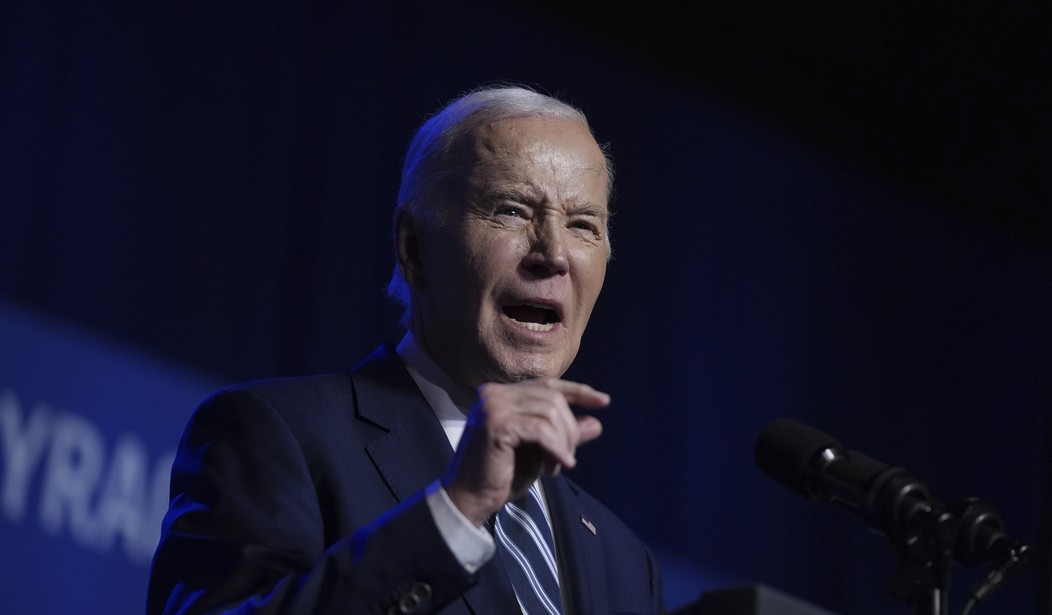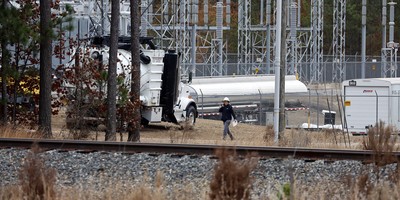Continuing on the theme of answering my own headline-posed question, let's just stipulate that no, of course it's not too late for President Joe Biden to "come back" and win this election. According to the RealClearPolitics average, as of yesterday, Biden trails former President Donald Trump by about one percentage point in a head-to-head matchup -- a statistical tie. When the field is expanded to a five-way ballot test, Trump's average lead bumps out to nearly three points, which is also within most polls' margin of error. State-level polling in the critical battlegrounds are more important than national numbers, and we'll address that below, but looking solely at the nationwide results, Biden is very much in the game. He's down a bit, it seems, which may explain why his team decided to take the leverage Trump's "anytime, anywhere" bravado afforded them and dictate the terms of this cycle's planned debates. The current president claims he doesn't believe the polls, but his campaign clearly believes them enough to recognize the need for something of a trajectory shakeup.
When Biden and Trump faced off nearly four years ago, the polling favored the Democrat. Too much. The final RCP average projected a Biden victory of 7.2 points. He won, but only by 4.5 points, a miss of nearly three percentage points. The difference between the anticipated and actual margins translated into a series of very tight victories in a handful of swing states, suggesting that they very well could have swung marginally in the other direction under slightly different circumstances and therefore flipped the overall result. Indeed, a combined total of just 44,000 votes in Arizona, Georgia and Wisconsin "separated Biden and Trump from a tie in the Electoral College," according to NPR. Needless to say, Trump's modest lead at the moment is a far cry from his 2020 deficit. In the entire 2020 cycle, Biden never lagged behind Trump in the polling average. Ever. So far, on this 2024 tracker, Trump has led Biden wire-to-wire.
Nobody is seriously predicting that this race is over, for good reason. Biden is, at worst, statistically tied overall, and well within the realm of striking distance. There's a long way to go. The conventions remain months away, and many voters don't really tune into campaigns until after Labor Day. Beyond that, Biden appears to have a valuable structural advantage among high-propensity voters, whereas Trump will need a lot of sporadic electoral participants to turn out for him (these numbers could also be boosted by tapping into a large reservoir of yet-unregistered Trump-leaners). But back to the aforementioned battleground polling. The premise of the headline stems from an analysis comparing FiveThirtyEight's polling averages from mid-May of 2020 to their final polling averages that November. Take a look at these statistics:
Recommended
📊 @FiveThirtyEight Polling Average
— InteractivePolls (@IAPolls2022) May 17, 2024
NEVADA
🟥 Trump 42.8% (+6.8)
🟦 Biden 36.0%
🟨 RFK Jr 11.4%
• May 16, 2020: Biden +4.3
• Final average: Biden +5.3
——
NORTH CAROLINA
🟥 Trump 45.8% (+6.2)
🟦 Biden 38.6%
🟨 RFK Jr 9.0%
• May 16, 2020: Biden +1.5
• Final average: Biden… pic.twitter.com/nGwzHO3oq4
Two factors jump off the screen: First, in five of these seven swing states, the polling average on May 16, 2020 was within one point or less of the ultimate November average. In Georgia, the average margin moved about two percentage points. In Wisconsin, it was roughly three points. In other words, four years ago (in another contest between these exact same two men), the polling at this point in the cycle wasn't appreciably different from how it looked on election day. If we see that same phenomenon play out this year -- granted, that's certainly still an 'if' -- that would be bad news for the Biden camp. Second, Trump ended up over-performing the polling-projected margins in all seven of these states in 2020. In some cases, he barely over-performed (Georgia). In others, he over-performed by a few points (Arizona, Nevada, North Carolina, Pennsylvania). And in two (Michigan, Wisconsin), Trump outpaced the FiveThirtyEight polling average margins by mid-single-digits.
It's impossible to say whether the rematch will produce similar effects, but Trump performing better than the polls suggested he would was a staple of both 2016 and 2020. But if past is prologue, consider this: Trump not only leads ever so slightly in the RCP national aggregation right now -- he also currently leads in the RCP averages (as of Sunday morning) in all seven of the aforementioned states. He's up, at the moment, by less than one percentage point in the two swing states (Michigan, Wisconsin) in which he over-performed the most last cycle, compared to the final polling average baseline. He's leading by two-to-six points in the other five places. Looking at the current polling snapshot (which, again, ended up looking quite similar to the final polling snapshot in 2020, by this point in the calendar), RCP projects Trump is on track to win 312 electoral votes, and therefore the election. FiveThirtyEight has Trump at 312 electoral votes, too. So does this aggregator:
📊 @DecisionDeskHQ Polling Average
— InteractivePolls (@IAPolls2022) May 19, 2024
NEVADA
🟥 Trump: 50.4% (+6.8)
🟦 Biden: 43.6%
.
ARIZONA
🟥 Trump: 48.9% (+6.1)
🟦 Biden: 42.8%
.
GEORGIA
🟥 Trump: 49.4% (+6.1)
🟦 Biden: 43.3%
.
NORTH CAROLINA
🟥 Trump: 50.1% (+4.6)
🟦 Biden: 45.5%
.
MICHIGAN
🟥 Trump: 49.0% (+4.0)
🟦… pic.twitter.com/T1DJIJ35Ae
I'll leave you with two thoughts. First, in light of Trump's enormous crowd last weekend in New Jersey, do juxtapositions like this matter? Last time, during the pandemic, Biden barely campaigned. Rally or event turnouts didn't matter in terms of predicting the election result. This time, society is fully back open. Do showings like Biden's in Atlanta reflect an enthusiasm problem, or will crowds again prove irrelevant? Lastly, in the post linked above, we examined Trump's potential opportunities to expand the map this fall, looking at the stretch state of Virginia. The Commonwealth's governor subsequently told me he believes it's in play. And look at where Trump was campaigning over the weekend:
NEW: Donald Trump’s Minnesota rally practically turns into a stand up comedy skit as he ditches the teleprompter.
— Collin Rugg (@CollinRugg) May 18, 2024
Amazing.
Trump even used props including a Biden Tic Tac dispenser to highlight Bidenflation.
At one point, Trump said Biden was “high as a kite” and demanded that… pic.twitter.com/fM5P7hAY5e
Some surveys show a tight race in Minnesota, though that state often ends up being fools gold for the GOP.
📊 Minnesota GE: KSTP/Survey USA
— InteractivePolls (@IAPolls2022) May 14, 2024
🟦 Biden 44% [=]
🟥 Trump 42% [=]
🟪 Other 9%
[+/- change vs April ]
—
• Feb: Biden 42-38%
• April: Biden 44-42%
• May: Biden 44-42%
—
538: #14 (2.8/3.0) | 5/8-11 | LVs | ±4.3% pic.twitter.com/H1NTfkAfxM

























Join the conversation as a VIP Member